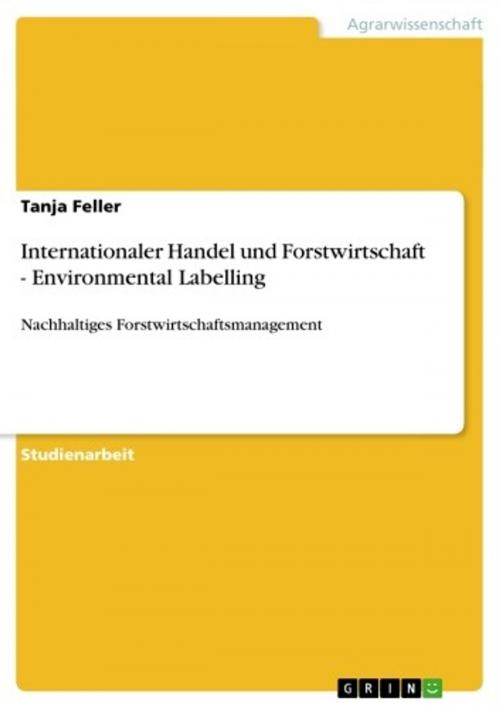Internationaler Handel und Forstwirtschaft - Environmental Labelling
Nachhaltiges Forstwirtschaftsmanagement
Nonfiction, Science & Nature, Technology, Agriculture & Animal Husbandry| Author: | Tanja Feller | ISBN: | 9783640368921 |
| Publisher: | GRIN Verlag | Publication: | July 8, 2009 |
| Imprint: | GRIN Verlag | Language: | German |
| Author: | Tanja Feller |
| ISBN: | 9783640368921 |
| Publisher: | GRIN Verlag |
| Publication: | July 8, 2009 |
| Imprint: | GRIN Verlag |
| Language: | German |
Studienarbeit aus dem Jahr 2005 im Fachbereich Forstwirtschaft / Forstwissenschaft, Note: 1,0, Hochschule Pforzheim (Volkswirtschaft), Veranstaltung: Wirtschaftspolitisches Seminar, Sprache: Deutsch, Abstract: This essay deals with the contentious issue of certification of forest products. Forest resources have been subject to an increasing deforestation process during the last fifty years. Although international trade in timber products is not the major source of global deforestation timber-related deforestation is greater than it needs to be. Illegal logging, unsustainable harvesting practices and distorting forestry policies all constitute to forest losses, especially in tropical countries. In order to protect natural resources on a global scale people from all countries have to cooperate. Since people from different countries have different cultural, social and financial backgrounds international agreements need to be signed to realise environmental goals. Developing countries are often not aware of the environment because they have to deal with problems such as poverty or political tensions prevailing in their country that are more serious to them. Nevertheless their cooperation is needed to reduce further deforestation. The international community needs to assist low income economies to make the adjustments needed for promoting more sustainable forestry. Certification of forest products, as part of any multilateral agreement, constitutes a policy-based instrument to ensure that all forest product exports are from sustainably managed sources. Therefore, certification is the only means to motivate regional governments to stick to a global environmental policy.
Studienarbeit aus dem Jahr 2005 im Fachbereich Forstwirtschaft / Forstwissenschaft, Note: 1,0, Hochschule Pforzheim (Volkswirtschaft), Veranstaltung: Wirtschaftspolitisches Seminar, Sprache: Deutsch, Abstract: This essay deals with the contentious issue of certification of forest products. Forest resources have been subject to an increasing deforestation process during the last fifty years. Although international trade in timber products is not the major source of global deforestation timber-related deforestation is greater than it needs to be. Illegal logging, unsustainable harvesting practices and distorting forestry policies all constitute to forest losses, especially in tropical countries. In order to protect natural resources on a global scale people from all countries have to cooperate. Since people from different countries have different cultural, social and financial backgrounds international agreements need to be signed to realise environmental goals. Developing countries are often not aware of the environment because they have to deal with problems such as poverty or political tensions prevailing in their country that are more serious to them. Nevertheless their cooperation is needed to reduce further deforestation. The international community needs to assist low income economies to make the adjustments needed for promoting more sustainable forestry. Certification of forest products, as part of any multilateral agreement, constitutes a policy-based instrument to ensure that all forest product exports are from sustainably managed sources. Therefore, certification is the only means to motivate regional governments to stick to a global environmental policy.















